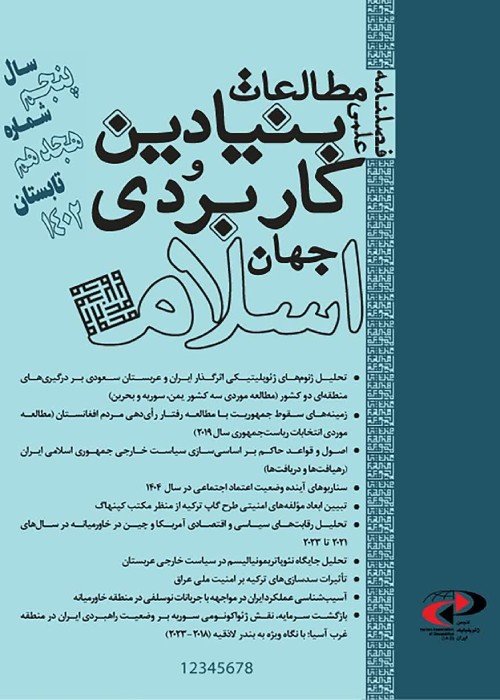The Impact of Petro Islam on Saudi Arabia's Regional Policies in the Horizon of 2035
Many researchers in the field of international relations return the history of using energy carriers as a component of Political supremacy to the Ramadan War(1973) between the Arab governments and Zionist regime.The 1973 war and the two major oil shocks after that, plus the boycott of oil sales to Israel, not only increased the price of this energy carrier in the world, but also influenced international political relations and entered a new concept in the field of political literature. Petro Islam, or the use of oil from Islamic countries to advance their goals is The general concept that especially in the area power of Salman bin Abdul Aziz and his younger crown prince Mohammed bin Salman has become more specific.In other words, the Kingdom of Saudi Arabia is today the only state that is seeking to expand its political influence in other parts of the world by Petro Islam. The present study examines the evolution of the theoretical concept of Petro Islam in the course of time to determine how the Saudi government, by focusing on the concept of Petroleum, seeks to dominate the Islamic world and to what extent this powerful instrument will shape the regional action of the Kingdom of Saudi Arabia on the horizon of 2035 .
The word petro-islam, as stated by Sandra Mackey, Middle East policy researcher and author of " The Saudis: Inside the Desert Kingdom" was first expressed by Fouad Ajami, a professor at Johns Hopkins University and deputy Minister at the US Department of Defense.After Fouad Ajami and Sandra Mackey, Giles kepel is one of the most important thinkers who has published a separate chapter describing the rise of political Islam in the new millennium, with the publication of Jihad: The Trail of Political Islam, Seeks to prove that Saudi empowerment is largely due to its petro-Islamic investment in the Muslim world. In fact, in terms of the modernity of the concept of Petro-Islam, rarely can a coherent book or writing be found that has a detailed description of the concept of Petro-Islam And so in the case of the research literature formed around the Petro-Islam, only the above documentation and, of course, the scattered articles and viewpoints can be mentioned.
The research method of this article is descriptive-analytical. library resources and other content sources, such as articles and dissertations, have been used as the main tools of this research.
After the rise of Salman bin Abdulaziz and the monopoly of power in the hands of his son and crown prince, Muhammad bin Salman, the Saudis have interfered with the widespread use of petro islam tools throughout the region and in the islamic world. The examples of the Yemeni war, the siege of Qatar, the arming of terrorist groups in Syria, the capture of the Lebanese Prime Minister, and the assassination of Jamal Khashoghchi at the Saudi embassy in Turkey are just obvious examples of a heightened trend showing how the new Saudi rulers are behaving inappropriately. On this basis, Saudi Arabia, which was highly regarded by Sunni governments, is now viewed as an aggressive state.
As noted above, it seems that changing Saudi Arabia's regional policies and turning its a priori policies into aggressive policies and increasingly emphasizing the use of oil and religious ideology to expand power in recent years are among the most important elements to consider. in the horizon of 2035, the most likely scenario for Saudi Arabia's regional policies under the rule of Mohammed bin Salman is the collapse of alliances and coalitions that, since 1981 under the auspices of the GCC led by Saudi Arabia, have coordinated the policies of the Arab Gulf states. Because of its geographical and ethnic proximity to Saudi Arabia and its rich financial resources, the circle of GCC countries is of great importance to Saudi politicians, and the failure of this alliance could be a major blow to Saudi soft power in the Muslim world and in West Asia. On the other hand in 2035 even if the regional structures and legitimizing institutions of the saudi emain, islamic world is likely to be governed by a concert of members rather than being ruled by a hegemonic power
Petro Islam , Saudi Arabia , Oil , Salafism , Islamic world
- حق عضویت دریافتی صرف حمایت از نشریات عضو و نگهداری، تکمیل و توسعه مگیران میشود.
- پرداخت حق اشتراک و دانلود مقالات اجازه بازنشر آن در سایر رسانههای چاپی و دیجیتال را به کاربر نمیدهد.



